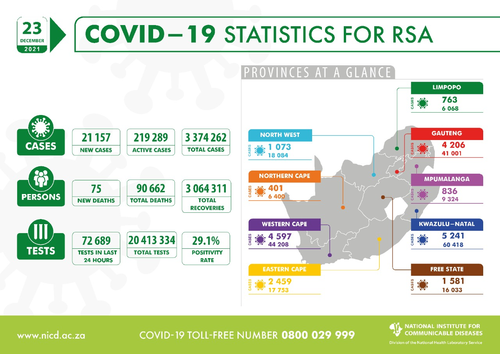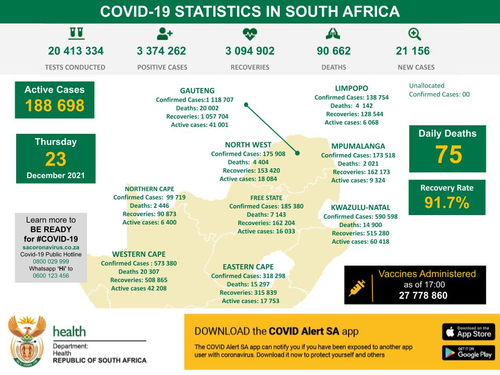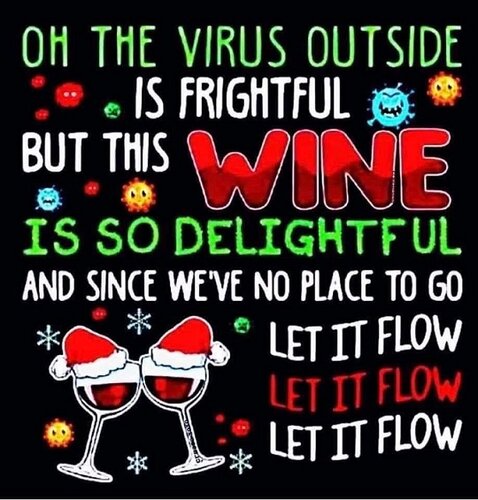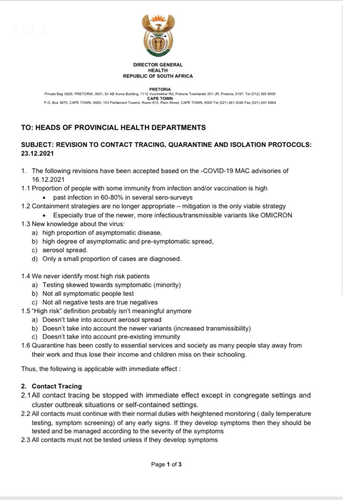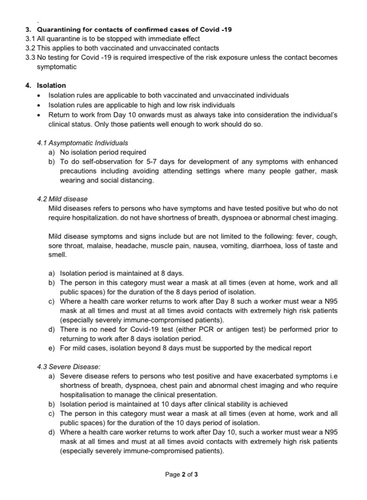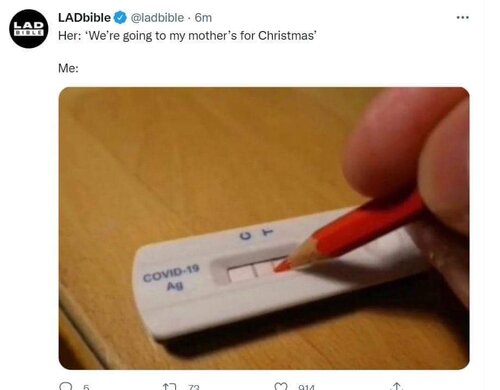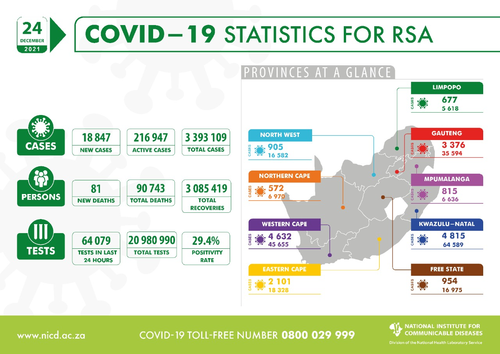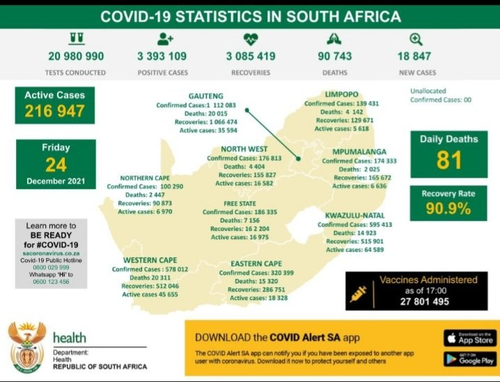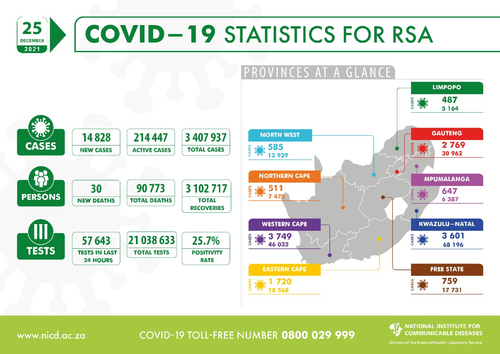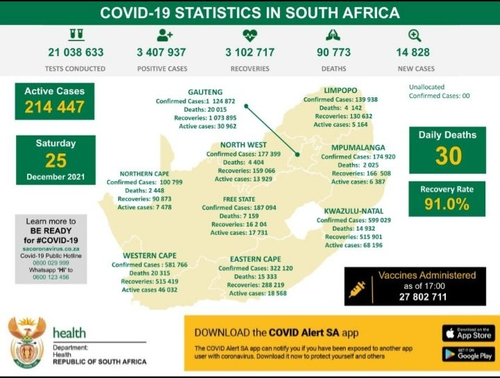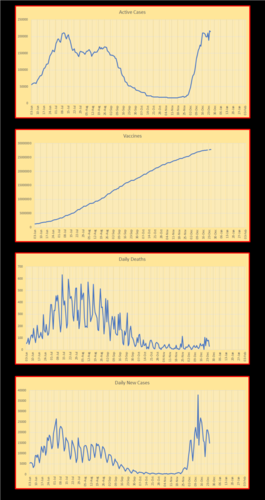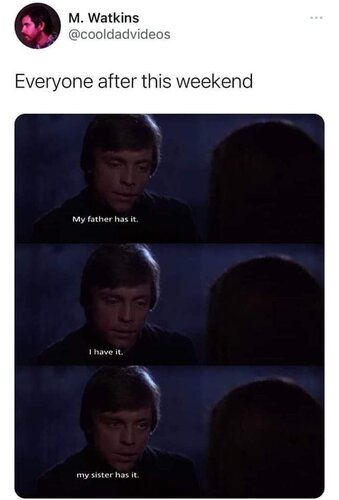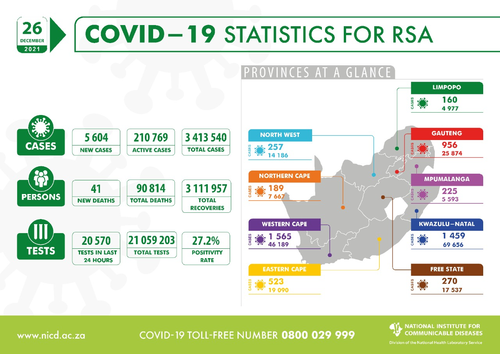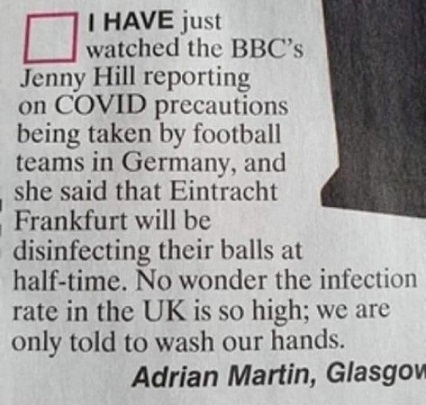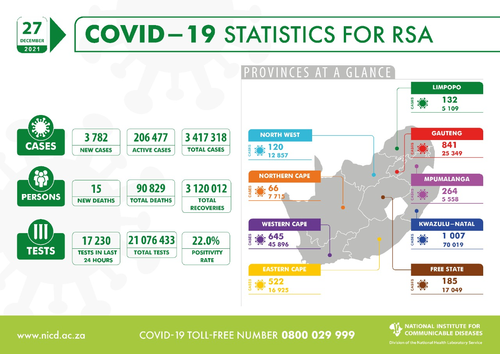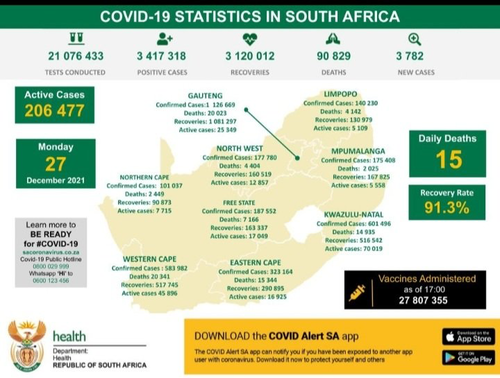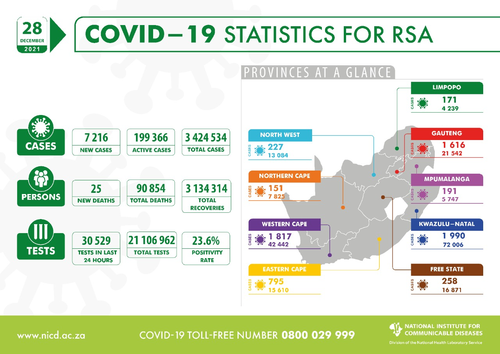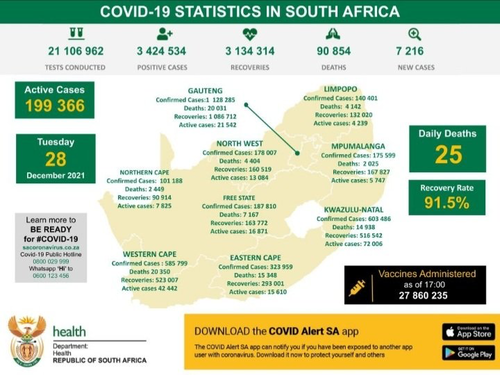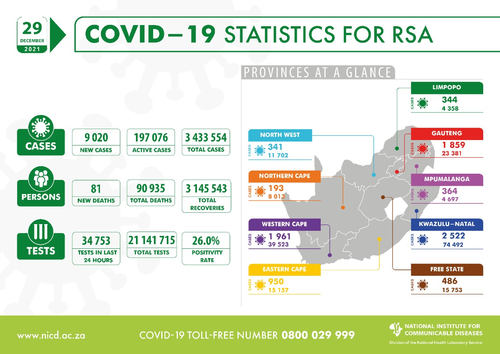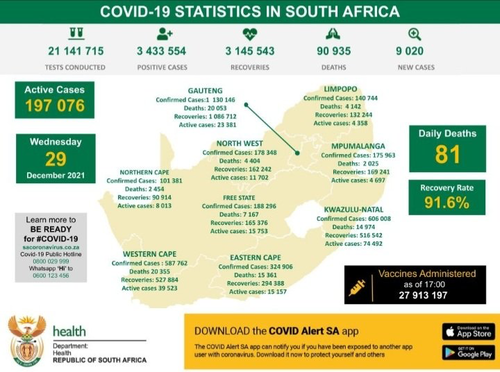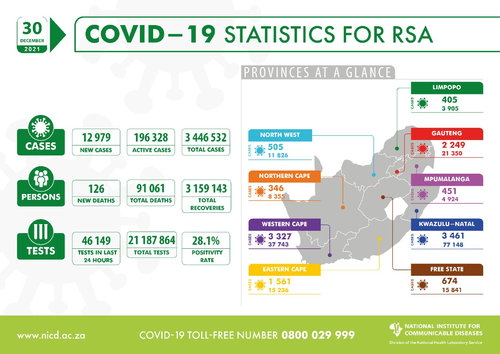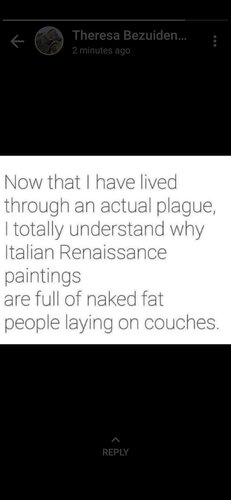Navigation
Install the app
How to install the app on iOS
Follow along with the video below to see how to install our site as a web app on your home screen.

Note: this_feature_currently_requires_accessing_site_using_safari
More options
You are using an out of date browser. It may not display this or other websites correctly.
You should upgrade or use an alternative browser.
You should upgrade or use an alternative browser.
Lockdown diaries - COVID-19 matters!
- Thread starter Grand Guru
- Start date
-
- Tags
- lockdown
REVISION TO CONTACT TRACING, QUARANTINE AND ISOLATION PROTOCOLS: 23.12.2021
Spare a thought for the person that came out of quarantine the day those revised regulations were published.
Rational Perspective: Author Brian Pottinger explains why Covid-19 now "in expiry phase - following a predictable path"
BizNews Radio https://open.spotify.com/episode/5peVpb1drU0poe94y3e0pk?si=1mUD_LbcQsWVaPC6mfWdyw
BizNews Radio https://open.spotify.com/episode/5peVpb1drU0poe94y3e0pk?si=1mUD_LbcQsWVaPC6mfWdyw
Very interesting take on the whole Covid situation! Well worth the watch!
Booster shots protect against symptomatic Omicron infection for about 10 weeks, study finds
https://www.businessinsider.co.za/how-long-does-booster-protection-omicron-covid-last-study-2021-12
25 Dec. 2021
Booster protection against symptomatic illness caused by the Omicron variant drops by up to 25% within 10 weeks, new real-world data has found – though it is not yet clear if everyone will need further doses in 2022.
The UK Health Security Agency (UKHSA) said protection against symptomatic Covid-19 caused by the variant dropped from 70% to 45% after a Pfizer booster for those initially vaccinated with the shot developed by Pfizer with BioNTech.
In the same analysis published Thursday, the agency found the effectiveness of Moderna's booster paired with two doses of the Pfizer vaccine held at 70 to 75% for up to 9 weeks, though not many people in the study received this regimen, which could affect the accuracy of the finding.
For those fully vaccinated with AstraZeneca's vaccine, booster effectiveness dropped from 60% to 35% with a Pfizer booster and to 45% with a Moderna booster after 10 weeks, the UKHSA said.
Eric Topol, director of the Scripps Research Translational Institute, said on Twitter Thursday that the UK findings were a "replication" of what has been seen in Israel.
https://www.businessinsider.co.za/how-long-does-booster-protection-omicron-covid-last-study-2021-12
25 Dec. 2021
Booster protection against symptomatic illness caused by the Omicron variant drops by up to 25% within 10 weeks, new real-world data has found – though it is not yet clear if everyone will need further doses in 2022.
The UK Health Security Agency (UKHSA) said protection against symptomatic Covid-19 caused by the variant dropped from 70% to 45% after a Pfizer booster for those initially vaccinated with the shot developed by Pfizer with BioNTech.
In the same analysis published Thursday, the agency found the effectiveness of Moderna's booster paired with two doses of the Pfizer vaccine held at 70 to 75% for up to 9 weeks, though not many people in the study received this regimen, which could affect the accuracy of the finding.
For those fully vaccinated with AstraZeneca's vaccine, booster effectiveness dropped from 60% to 35% with a Pfizer booster and to 45% with a Moderna booster after 10 weeks, the UKHSA said.
Eric Topol, director of the Scripps Research Translational Institute, said on Twitter Thursday that the UK findings were a "replication" of what has been seen in Israel.
SA drew global praise for new self-isolation rules. They lasted 5 days.
https://www.businessinsider.co.za/s...-and-isolation-protocols-after-5-days-2021-12
29 Dec. 2021
That is due to the sudden reinstatement of national contact tracing and isolation protocols that, just five days earlier, the department of health had described as "costly to essential services and society as many people stay away from their work and thus lose their income and children miss on their schooling."
The now-reinstated rules had also served little to no purpose, the health department said at the time.
So, on 23 December, in a formal circular to the heads of provincial health departments made public the next day, the national department's director-general Sandile Buthelezi announced that South Africa had immediately dropped contact tracing, and would no longer impose restrictions on asymptomatic carriers of the coronavirus.
But on Tuesday Buthelezi's department said in a media statement that, "in line with the principles of transparency and openness, the department has decided to put the implementation of the revised policy changes on hold, while taking all additional comments and inputs received into consideration."
It did not say why that decision had been made, only that a new version of the rules would be issued "once all additional inputs and comments have been considered".
"This means the status quo remains, and all prior existing regulations with regards to contact tracing, quarantine and isolation remain applicable," the department said, somewhat confusedly.
At the time that statement was issued, the status quo was actually that only people showing symptoms of Covid-19 were subject to restrictions on their movement.
Under the rules that were in force for those five days, those who tested positive for the coronavirus but showed no symptoms were asked to do only two things: self-observe for five to seven days for the onset of symptoms, while "avoiding" large groups of people and being careful to follow the mask and social distance rules that apply to everyone, all the time.
The implications were laid out unequivocally in a FAQ published on the government's SACoronavirus website on 24 December.
Meanwhile, there was no contact tracing "except in congregate settings and cluster outbreak situations or self-contained settings", such as prisons. The contacts of an infected person would not be tested, and were expected to "continue with their normal duties with heightened monitoring" – which would keep health workers at work even after an exposure event.
The rules that lasted five days were based on a 16 December advisory from the Ministerial Advisory Committee (MAC) on Covid-19, which had warned it "serves little overall public health purpose" to force isolation on the asymptomatic, while doing so led to loss of income and school time, and threatened the stability of institutions such as hospitals when key workers were not available...
The withdrawal of those same rules were on Tuesday met largely with confusion."
https://www.businessinsider.co.za/s...-and-isolation-protocols-after-5-days-2021-12
29 Dec. 2021
- The department of health on Tuesday withdrew a days-old circular that had radically changed South Africa's approach to self-isolation and contact tracing.
- You are now, again, required to self-isolate if you had contact with someone who later tests positive for the coronavirus.
- The change had been based on scientific advice. It is not clear on what basis it has been rolled back.
- In the five days during which the new rules lasted, they drew attention around the world.
That is due to the sudden reinstatement of national contact tracing and isolation protocols that, just five days earlier, the department of health had described as "costly to essential services and society as many people stay away from their work and thus lose their income and children miss on their schooling."
The now-reinstated rules had also served little to no purpose, the health department said at the time.
So, on 23 December, in a formal circular to the heads of provincial health departments made public the next day, the national department's director-general Sandile Buthelezi announced that South Africa had immediately dropped contact tracing, and would no longer impose restrictions on asymptomatic carriers of the coronavirus.
But on Tuesday Buthelezi's department said in a media statement that, "in line with the principles of transparency and openness, the department has decided to put the implementation of the revised policy changes on hold, while taking all additional comments and inputs received into consideration."
It did not say why that decision had been made, only that a new version of the rules would be issued "once all additional inputs and comments have been considered".
"This means the status quo remains, and all prior existing regulations with regards to contact tracing, quarantine and isolation remain applicable," the department said, somewhat confusedly.
At the time that statement was issued, the status quo was actually that only people showing symptoms of Covid-19 were subject to restrictions on their movement.
Under the rules that were in force for those five days, those who tested positive for the coronavirus but showed no symptoms were asked to do only two things: self-observe for five to seven days for the onset of symptoms, while "avoiding" large groups of people and being careful to follow the mask and social distance rules that apply to everyone, all the time.
The implications were laid out unequivocally in a FAQ published on the government's SACoronavirus website on 24 December.
Meanwhile, there was no contact tracing "except in congregate settings and cluster outbreak situations or self-contained settings", such as prisons. The contacts of an infected person would not be tested, and were expected to "continue with their normal duties with heightened monitoring" – which would keep health workers at work even after an exposure event.
The rules that lasted five days were based on a 16 December advisory from the Ministerial Advisory Committee (MAC) on Covid-19, which had warned it "serves little overall public health purpose" to force isolation on the asymptomatic, while doing so led to loss of income and school time, and threatened the stability of institutions such as hospitals when key workers were not available...
The withdrawal of those same rules were on Tuesday met largely with confusion."
Not like anybody was keeping to the curfew anyway.
https://www.businessinsider.co.za/trending/new-lockdown-rules-no-curfew-or-bar-hours-2021-12
Party on: Curfew, booze restrictions will be dropped, govt just announced
https://www.businessinsider.co.za/trending/new-lockdown-rules-no-curfew-or-bar-hours-2021-12
Party on: Curfew, booze restrictions will be dropped, govt just announced
- Lockdown rules are changing dramatically, the government announced on Thursday night.
- Curfew is being dropped, and so are booze sale limitations.
- Big gatherings have also been okayed.
Similar threads
- Replies
- 0
- Views
- 1K
- Replies
- 1
- Views
- 2K
- Replies
- 0
- Views
- 1K


